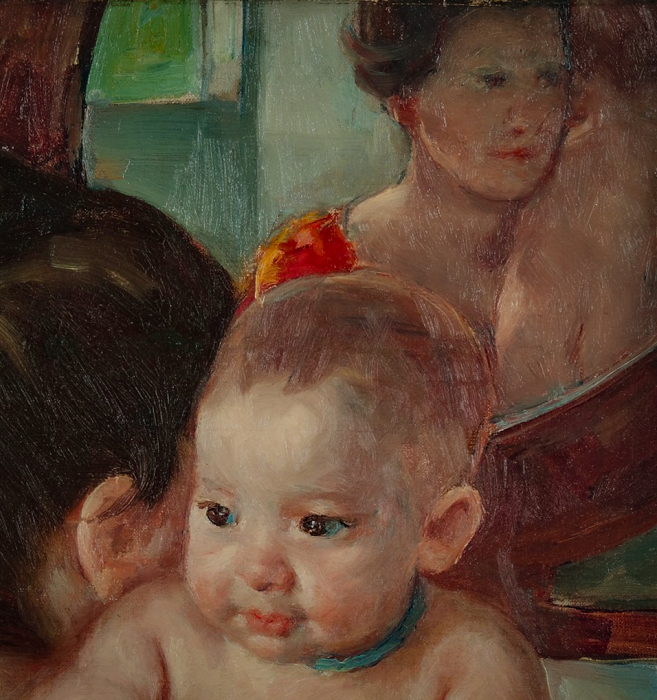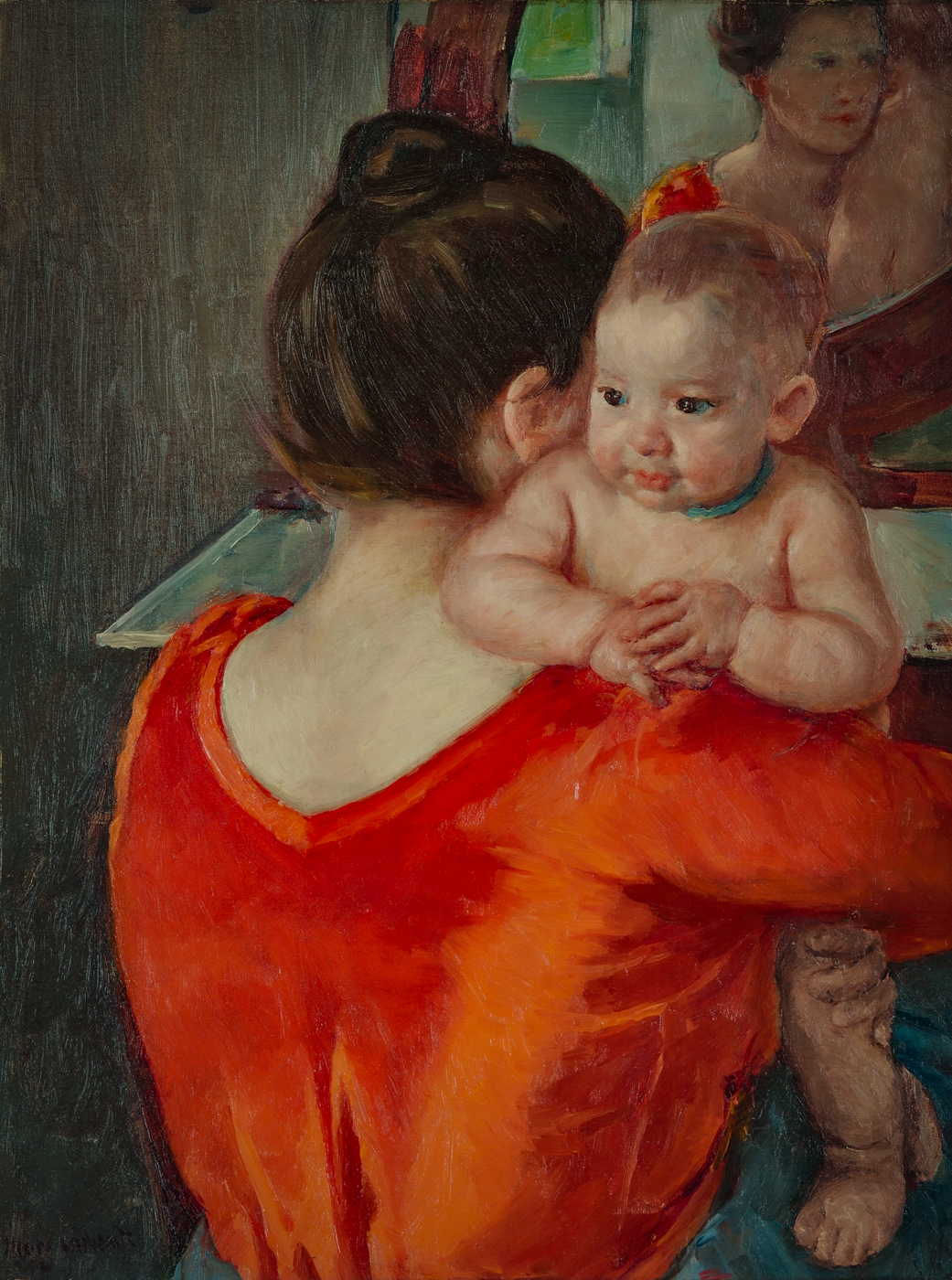

Kairos, Clocks & Motherly Love
Mrs. Sarah Reardon

Pope John Paul II was allegedly once asked what he did with his free time. As the story goes, he responded, “All my time is free.”
His time was free for him to give away in the service of God and others, and that is what he did. And in this he himself was free. I have come to believe that it is the same — or should be —for the homemaking mother, as well. She is free to serve, and her time is freely given away. But it took quite a bit of time (free or otherwise) for me to realize this.
Before giving birth to my daughter, I worked at a school. The role of a teacher in today’s world is ruled by the dictates of time — or more precisely, a particular type of time that we can call chronos. This is not necessarily a bad thing; it is simply the way that the modern school functions. In the life of a school, every class period and recess and lunch break and meeting is bound by considerations of the clock and the unyielding hourly bells — that is, by chronos. The hands of the clock on the wall teach a truth beyond what teachers express in words: life has an order, and we would do well to adhere to it. Even school email etiquette is highly tied to chronos time. And this works well enough for an institutional school and for many other things. But it also greatly colored my plans and expectations for motherhood, which is a rather different sort of thing.
What’s more, before my daughter was born, I read several books and countless blog posts about schedules, nursing, sleeping, swaddling, pacifying, and the like — about, in short, a certain set of widely held beliefs regarding the care and management of little ones. As I read, I began to internalize their narratives of babyhood: narratives haunted by the ghosts of consumerism and perfectionism, narratives supported by much of the modern medical industry, narratives enforced implicitly by the increasing range of baby items on offer from the baby industry, which are supposed to be incorporated on a precise (and lucrative) timetable. In essence, these narratives insist that Baby must have a perfect schedule, in which Baby eats and sleeps (in just the right way, not on his belly, not cuddling on Mom) and plays (with just the right toys for his particular stage of development) at a specific, exact time, and that Baby ought to suffer until he catches up to Mom’s schedule. Betwixt all these events, Baby must, of course, get all his shots and checkups at precisely the right moment, not a day too soon nor a day too late. In short, chronos — the time of the clock and the schedule — had captured my imagination of what mothering would and should be like.
But the truth taught by the ads, the books, and the classroom clock is only a half-truth: the order of chronos represents only some of our experience. There is another order that pervades our mundane routines: a higher order of time, that of a “real time” or “divine time” that does not submit to manmade regimens. When my daughter was born, to my tremendous surprise, a way of experiencing time that is much more open to the unschedulable and unmeasurable overtook my plans for our new life together. And this we might call kairos.

There is another order that pervades our mundane routines: a higher order of time, that of a “real time” or “divine time” that does not submit to manmade regimens.

As is often the case, the ancients had more nuanced, precise language than we do: chronos (χρόνος) is one Greek word for time, and kairos (καιρός) is another. Much has been made, both in popular and academic discourse, of the distinction between the two. Various writers discuss the terms somewhat differently; some discuss kairos as “divine time” or, considering the term in light of its connotations in classical rhetoric, as “the right time.” (The Greeks also anthropomorphized both in their pantheon — Chronos being an old and demanding fellow, often depicted with a foreboding scythe in hand, and Kairos a young, lithe deity, herald of opportunity and the current moment.)
Madeleine L’Engle, who considered the terms in her beloved novel A Wrinkle in Time, explains them in the footnotes to a family tree in one edition of the novel, defining chronos as “ordinary, wrist-watch, alarm-clock time” and kairos as “real time, pure numbers with no measurement.” Much of the book has to do with the idea of kairos, with finding, in the words of Mrs. Whatsit, the “propitious moment” to rescue the protagonists’ father from his imprisonment. Other works of Mrs. L’Engle’s dwell directly on the distinctions between chronological time and kairotic time. In her memoir A Circle of Quiet she writes:
Kairos is not measurable. Kairos is ontological. In kairos we are, we are fully in isness… Kairos can sometimes enter, penetrate, break through chronos: the child at play, the painter at his easel, Serkin playing the Apassionata, are in kairos. The saint at prayer, friends around the dinner table, the mother reaching out her arms for her newborn baby, are in kairos. The bush, the burning bush, is in kairos, not any burning bush, but the very particular burning bush before which Moses removed his shoes; the bush I pass on my way to the brook. In kairos that part of us which is not consumed in the burning is wholly awake. We too often let it fall asleep, not as the baby in my arms droops into sleepiness, but dully, bluntingly.
I sit in the rocking chair with a baby in my arms, and I am in both kairos and chronos. In chronos I may be nothing more than some cybernetic salad on the bottom left-hand corner of a check; or my social-security number; or my passport number. In kairos I am known by name: Madeleine.
The baby doesn’t know about chronos yet.
When I, lying in bed at seven months pregnant, read these reflections, I was moved by the mention of mothers and children. L’Engle’s examples of artists and saints in kairos did not surprise me: for myself, it was in moments of serenity in art or in creation that I felt unwound from clock time and “fully in isness.” In moments sitting at the piano bench as a child or standing in front of a painting by one of the Dutch Masters or watching the sunlight dapple the surface of the river from a kayak, I have felt that unmeasurable “real” time breaking in.
But this “mother reaching out her arms for her newborn baby” did surprise me. I knew, of course, that the bond between mother and baby is something wholly different from any other human relationship; I already felt the intimacy of my connection with my unborn child, whose life I sustained and whose birth I looked forward to with hope and joy. Still, I didn’t think of maternal affection in the same category as saintly devotion or artistic epiphany. I imagined a tenderness between my child and myself, certainly, but I also imagined a strict schedule that I would answer to — a regimen that would define my future days as a stay-at-home mother of a newborn — albeit with it a certain anticipated fatigue due to the difficulty of mothering. During pregnancy, I never considered that not just my sleeping hours but also the meaning of time itself would shift after my baby was born.
But shift it did. This time change is not a literal alteration of hours, of course, but has to do with a new quality and order of time that the homemaking mother experiences.
At first, I did try to keep my baby daughter on a rigorous schedule, following the advice of the books I had read. This attempt quickly failed, and my expectations regarding her sleep also proved inappropriate. For a while, I persisted in my diligent attempts at a regimented babyhood: I wrote down every time at which she nursed, along with brief notes on each nursing session, on a little yellow legal pad.
Such attempts petered out as she grew older and learned more about life outside the womb and as we together learned the rhythm of our new existence. Kairos eventually conquered chronos in my postpartum days. And I have discovered, to my delight, that the life of the homemaking mother is often far more open to the unmeasurable sort of time than I had imagined. Certainly, I, like any mother, maintain fixed appointments and scheduled events: 11 am at the park, 7 pm bathtime, 9:30 am church on Sunday, and so on. Yet I find my life is not primarily ordered by chronos but by the needs of the people and place of the home. The life of the homemaking mother can be a kairotic one in a way that few other modes of life can.
When I became a mother and my life became ordered not by my principal’s schedule but by the people and place of my home, a new freedom entered my life. I found sitting on the rocking chair with my daughter, even during a midnight nursing session, to be an event seemingly outside of time. I found myself able, as never before in my adult life, to take long walks at any time of day, whether with friends or only with my daughter. I found myself free to sign up for meal trains, spontaneously visit my grandmother during the week, or volunteer my help to a family member or friend without needing to substantially rearrange my schedule. I found I had more space for creative pursuits: more mental energy to write, more inspiration to sew, and much more time to bake and cook than when I worked outside the home. I found new joy in playing with my daughter, and I found more fulfillment and validation in her laughter and smiles than I ever had in the praise of a professor, editor, or employer.

I found sitting on the rocking chair with my daughter, even during a midnight nursing session, to be an event seemingly outside of time.

Without a doubt, my days with one baby look different than those of a homemaking mother of seven, or a homeschooling mother of any number of children, for that matter. In some stages of life, the free-form nature of the homemaker’s time may prove to be not merely a blessing but also a challenge: it may be difficult for a mother to accomplish certain necessary tasks while a gaggle of children play at her heels, and she may long for more order in her days. She may sometimes wish her children’s needs somehow obeyed the clock, so that she could find a little more time to meet her own! And in certain seasons, the homemaking mother may indeed reasonably follow some greater degree of schedule in order for her home to flourish, while in other seasons the sort of schedule she longs for is not attainable.
As I have learned from my conversations with older mothers and homemakers, though, it seems that when a person is able to devote herself fully to her home and children, her time and life take on a new quality of sovereignty, and her life opens to welcoming kairos moments when they come.
Too often, people bemoan the burden of children, the loneliness of staying at home, or the darkness of the postpartum blues as if there were no joy or benefit at all to motherhood. A prominent pop singer recently went viral for pronouncing that all her friends who have young children are “in hell.” This cultural emphasis is understandable, for in our society many women do experience such loneliness and challenges. But rarely do we hear of the beauty of a baby asleep in his mother’s arms, the joy of dedicating oneself to the flourishing of a family, or the luxury of the sovereignty that comes with running a household.
To live in this world, the world of the unhurried mother and child, the world of kairos, is to know and be known by something real and sacred, to participate in something creative beyond numbers and schedules and meetings and screens. Of course, it is not just homemakers who may experience the beauties of kairos time – the fisherman on the dock at sunset knows this, as does the grandfather telling his grandchild a story, the person at prayer, and countless others. My husband has even said that he experiences kairos when doing landscaping work. It is not just about mothering or homemaking; it is a core aspect of human life itself, as God intended it to be lived. Yet in our current day and age, we mothers at home are fortunate to experience kairos more fully and more frequently than most. Far from being “in hell,” I am, by the grace of God and thanks to the hard work of my husband, relishing a new vocation. Freedom and creativity are available to me in a way I have never before experienced. These are the gifts of this life I lead.
As one mother and writer, named Maria, observed regarding the aforementioned words of John Paul, “all my time is free, too. I have been given the gift of free will, and even though it sometimes doesn’t feel like it, I do choose every day to wake up and serve my family . . . the most beautiful thing of all is this: that freedom is the beginning of love. It cannot exist without it.” If freedom is the beginning of love, then kairos is the time of love. Working in chronos time can be an act of love, which serves a family, of course. But that’s different than the time in which love is. Like L’Engle’s “mother reaching out her arms for her newborn baby,” we who are homemakers (and to whatever extent possible, all people) should extend our arms to welcome the beauty of kairos whenever we can. We are not in hell. Rather we are free — free to respond, to know and to be known, to give of ourselves to little souls to whom chronos and its burdens so far mean nothing at all.

